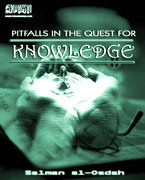Pitfalls in the Quest for Knowledge

CHAPTER THREE
Studying Particulars before Principles
Some students concern themselves with subsidiary matters before becoming grounded in the requisite principles.They focus on the most minor of issues while ignoring the major ones.Many students do this out of their love for debate and their desire to participate with others in the exchange of ideas.There are always a group of topics that students of knowledge discuss with each other for hours on end.Though these never number more than ten or twenty topics,rarely do students discuss with each other anything else.
A Few Examples:
- -After rising from the bowing position in prayer,should you fold your hands over your chest or should you let them hang at your side?
- -In prayer,should you remain seated for a moment after rising from the second prostration and before rising to the standing position?
- -Should you move your finger while reciting the tashahhud,and how should it be moved?How should the hand be positioned?Likewise,should you move your finger while seated between the two prostrations?
These are from a limited number of questions that students tend to spend endless hours debating.At the same time,you find that they ignore fundamental matters of belief and sweeping principles of law.They do not bother to read up on these more important matters nor review them,because their fellow students are not discussing such matters. Therefore,such topics will not afford the student the opportunity to debate with his peers and show of his talents.
We are not among those who say that these secondary matters are trivial and that they should be ignored.Such a stance is undoubtedly wrong,since nothing about our religion is trivial.However,some matters need to be dealt with before others.General principles come before minor details.This is the proper approach to seeking knowledge.A student should also be cognizant of the fact that scholars are often in disagreement about secondary matters.
If you were to ask some students of religious knowledge about matters of belief,you would find their knowledge to be confused or deficient.If you were to ask him about the general precepts of Islamic Law,you would find him disdainful of them.He would be no better off when it comes to general ethics and matters of jurisprudence.However,you will find him well acquainted with a number of secondary questions that he focuses on to the exclusion of everything else.
This shows a student devoid of wisdom,since wisdom mandates putting everything in its proper place.It is blatantly unwise to fail to establish a basic article of belief because of being too busy establishing a sunnah act.It is equally foolish to get into arguments with people about some minor issue while neglecting the fundamentals of belief.We should not spend all of our time teaching people a single sunnah and neglect the widespread moral degradation that is afflicting our societies in this day and age.
We can all see that Muslim societies are the target of a vicious war that does not seek to remove only secondary matters and sunnah acts.This war targets the very foundations of our belief.Many of our societies are under the sway of men with deviant ideas: communists,socialists,secularists,and others.They attack Islam at its very roots,seeking to make the people doubt their faith.
Our societies are equally plagued by irreligious,licentious men who seek to turn our societies into dens of sin.Both of these groups have achieved their goals to a great extent. It is unwise for students of religious knowledge to ignore these developments and focus all of his energies on some minor points of law.
Each issue should be accorded the attention that it warrants.No single issue should be made into the topic of all discourse and debate.
We should not be neglectful of any sunnah.We should teach the people the guidance of the Prophet (peace be upon him)in all of its detail.At the same time,we must recognize that people are different.A person who is upright and virtuous and prays regularly needs to be taught all the sunnah acts of prayer.It is not enough for such a person to know only the basic,obligatory acts.We should teach him how to perfect his prayer.
At the same time,this should not get in the way of our calling to Islam those who are astray or sinful.We must call such people to the fundamentals of Islam and strive to bring them from their state of deviance and sin to the illumination of knowledge and faith.
We must not neglect these people.They must be our first priority.A person who has faith and is performing his prayers will,by Allah’s grace,be in no grave danger if he dies without ever learning about a particular sunnah act.As for the other person who is engrossed in sin or misled by false beliefs,he is in grave danger.Therefore,saving him from peril is far more important than teaching the pious Muslim about a particular sunnah.Of course,it is our duty to do both if we can.
